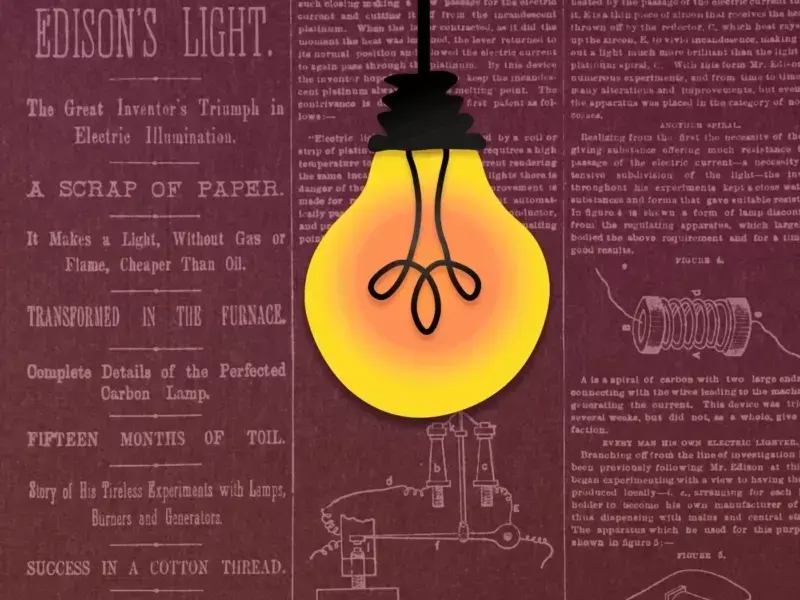Thomas Edison told journalists they would each receive a brief, private demonstration of the new light bulb’s capacities. They could marvel at what he had achieved before he swiftly ushered them away, ensuring they’d be out of the room long before the bulb burned out. Illustration by Meilan Solly / Background via Library of Congress
I’m presently 70 years old, thank the Lord for every day of life that He blesses me with. An idea came to me long ago, oh, about fifty-five years or so ago, that much, most in fact, of what people hold as resolute facts according to the world’s knowledge in truth the exact opposite is true, and if not the exact opposite, well, then, much of what folks cling to as factual is for the greater part a load of rubbish with perhaps a few precious gems in the mix.
Old wifes’ tales [as opposed to young wives’ tales? See, another example], myths, hyperbole, exaggeration, fantasy, 3,756th handed down so-called information, and out-and-out fabrications. Lies. Distortions. Even told to us all in classrooms, by parents no matter how well-meaning, by friends, relatives, neighbors, co-workers, teachers, and those held in high esteem.
The world’s knowledge, if we are objective, thinking, thinking critically, logically, using the good minds the Good Lord blessed us with in conjunction with the Word of God the Good Lord blessed us with —we ought to then know much, most of what is held as sound knowledge from the world is fluid. Changeable. At best. And inaccurate, incorrect, and dead wrong in many instances.
This is true in hero worship, which is idol worship. From history lessons, biographies, and, again, the classroom.
A perfect example is found below. Thomas Alva Edison was a very intelligent man. An inventor of renown and great fame. He was also an equally accomplished self-promoter, a societal-approved con man as opposed to the con men who are not embraced by society. He was an accomplished actor. And, yes, inventor.
Playing fast and loose with the facts, the truth, which if we are objective? it’s deceiving. It’s lying.
Is there anyone among us who has not done this?
The only person who ever lived on this earth I think that could say that they never partook of such is the Lord Jesus Christ. All others, if honest, must plead guilty.
This isn’t appearing here to defame or ridicule Mr. Edison. Or diminish his worldly accomplishments. No, it’s here only to provide one small example of an ongoing, constant worldwide ill. Much of what we have adopted, accepted, and believe as history, the truth, reality and factual is incorrect. Sometimes grossly magnificently wrong.
We for the greater part, among the largest percentage of people, accept and adopt what we’re told by the world. Without questioning it. Without many taking the time to seek more truth, what is real, what is the real story — the most accurate history, telling and knowing of the events or an event.
We do not question much of what the men and women of the world have told us over time. Or presently, although skepticism is growing. Perhaps because lies dominate and are the rule over the past many decades more so than perhaps any other time in history. And folks don’t seem to care or feel ashamed about their lying.
It’s become the status quo. Expected. In business, in government, and in personal relationships.
All excused.
Call out someone for lying and see what happens. Question something presented as factual though clearly wrong, a lie — here’s an example; men can become women just by saying they are, or that there are 63 genders and counting, or that no one really knows when life begins in the human womb [even though it’s a living human sperm entering a living human egg and life from both living organisms create a new instantaneous human life], and a person doesn’t need to possess an IQ of 200 or be highly educated to know this fact, and many others — though as the world lies the people accept, adopt, and accommodate every one that comes along in these times.
Imagine that.
Yeah, about 55 years ago, from listening to many adults and their words, from sitting in many classes listening to a nonstop flow of words from the tongues of myriad teachers, and doing some research on my own, some thinking on my own, some evaluating, comparing and observation — especially with the passage of time — my theory no longer was just that, a theory, and has been proved time and time again.
Let us all endeavor to not accept, adopt, or accommodate anything and everything that comes along, that we’re told by the people of the world. No matter who they may be, no matter their credentials. Let us seek the facts, the truth, in all things.
And to do this accurately requires being Bible fluent, Bible literate, and placing the highest and greatest value on the words contained in the Word of God rather than the words of men, women, and now even children who are ruling adults as never before in world history.
There is a vast difference between spiritual wisdom, godly wisdom as garnered from the Holy Spirit, from the Holy Bible, from meditating and praying over and in the Word of God, and the wisdom of the world. As vast a difference as the day is to the night.
For the wisdom of this world is foolishness with God. For it is written, He taketh the wise in their own craftiness. And again, The Lord knoweth the thoughts of the wise, that they are vain.
1 Corinthians 3:19-20
Crafty. Sick. Cunning. Beguiling. Seductive. From the time in the Garden listening to the serpent to what has entered the ears, the eyes, the heart, and mind this very day.
Let us be wise as serpents, innocent as doves as the Lord instructed us to be.
Turning to the word of God faithfully, believing, trusting. While being much more suspect, cautious, and discerning of everything and anything the world is attempting to persuade us into believing, following and accepting.
Why this now? Because more and more deceptions are coming. Many signs and wonders that will deceive many.
Do not be among them dear friends, fellow believers in the ways and Word of the Lord.
Do not be among them dear friends who are yet to believe and allow the Holy Spirit to work within them to transform them into disciples of the Lord Jesus Christ by their faith, by their just believing the Bible, all of it, and asking the Lord to help them. Show them His ways.
Because there are more Thomas Alva Edison’s in the world than folks know. Oh, they may appear so wise, so smart, so much smarter than we are, so much more accomplished, learned, educated, and who can question them?
We can.
Always.
According to the Word of God.
Proclaiming Christ Crucified
And I, when I came to you, brothers,a did not come proclaiming to you the testimonyb of God with lofty speech or wisdom. For I decided to know nothing among you except Jesus Christ and him crucified. And I was with you in weakness and in fear and much trembling, and my speech and my message were not in plausible words of wisdom, but in demonstration of the Spirit and of power, so that your faith might not rest in the wisdom of menc but in the power of God.
Wisdom from the Spirit
Yet among the mature we do impart wisdom, although it is not a wisdom of this age or of the rulers of this age, who are doomed to pass away. But we impart a secret and hidden wisdom of God, which God decreed before the ages for our glory. None of the rulers of this age understood this, for if they had, they would not have crucified the Lord of glory. But, as it is written,
“What no eye has seen, nor ear heard,
nor the heart of man imagined,
what God has prepared for those who love him”—
these things God has revealed to us through the Spirit. For the Spirit searches everything, even the depths of God. For who knows a person’s thoughts except the spirit of that person, which is in him? So also no one comprehends the thoughts of God except the Spirit of God. Now we have received not the spirit of the world, but the Spirit who is from God, that we might understand the things freely given us by God. And we impart this in words not taught by human wisdom but taught by the Spirit, interpreting spiritual truths to those who are spiritual.d
The natural person does not accept the things of the Spirit of God, for they are folly to him, and he is not able to understand them because they are spiritually discerned. The spiritual person judges all things, but is himself to be judged by no one. “For who has understood the mind of the Lord so as to instruct him?” But we have the mind of Christ.
Footnotes:
a 1 Or brothers and sisters
b 1 Some manuscripts mystery (or secret)
c 5 The Greek word anthropoi can refer to both men and women
d 13 Or interpreting spiritual truths in spiritual language, or comparing spiritual things with spiritual
1 Corinthians 2
Everything from God, everything within the Word of God is true. Eternally sound. Unchangeable. Eternally true.
What of the world’s words, ways, and knowledge can that be said and have it hold up?
Ken Pullen, A CROOKED PATH, Tuesday, August 1st, 2023
How Thomas Edison Tricked the Press Into Believing He’d Invented the Light Bulb
A year before he developed a working bulb, the “Wizard of Menlo Park” created the illusion that his prototype burned for more than a few minutes at a time.
June 27, 2023
Reprinted from Smithsonian Magazine
In the autumn of 1878, Thomas Alva Edison had a problem. He hadn’t invented the light bulb—yet. Or, to put it more precisely, he had invented a light bulb, but he couldn’t keep it lit for more than a few minutes at a time. He still hadn’t figured out how to regulate the temperature of the light bulb’s internal filament, meaning the incandescent bulb would immediately overheat, and the filament would promptly melt down.
Unfortunately, Edison was running out of time. All over North America and Europe, inventors like him were working on—and patenting—their own electric projects. Sooner or later, somebody would wind up harnessing electricity. The English chemist Joseph Swan, Edison knew, was hard at work on a rival light bulb. Two Canadians, Henry Woodward and Mathew Evans, had already patented an inefficient design four years before.
But that fall, Edison had an even more pressing deadline to face: The journalists were coming. In September, he’d assured the popular press that his latest invention, the incandescent light bulb, was complete. “I have it now,” he told the New York Sun, boasting that “everybody will wonder why they have never thought of it, it is so simple.”
He’d already made his sales pitch: “When the brilliancy and cheapness of the lights are made known to the public” (which would, he promised the Sun, be in just “a few weeks”), America would undergo another scientific revolution. “Illumination by carbureted hydrogen gas”—the inefficient, expensive and often dangerous gas lamps common on American streets and in American homes—would be “discarded.” In its place, electricity would rise to the fore.
Electricity, to the Gilded Age mind, wasn’t just a technology. Rather, it was a mysterious, thrilling, invisible, quasi-magical force that had become synonymous with scientific discovery and the whole arc of human progress. It was, as one guidebook put it, that “subtle and vivifying current,” the source not just of light but of life itself. “Comply with electricity’s conditions,” another writer marveled, “then but turn a key, and the servant of all life will be present in light and power.”
If electricity was magic, then Edison was its chief magician, at least according to the press. He was the “Wizard of Menlo Park,” a reference to his New Jersey laboratory, as well the “Napoleon of Science,” the “Genius of Menlo Park” and the “New Jersey Columbus.” He was almost certainly America’s greatest inventor. But he was also one of the country’s canniest self-promoters, forging close personal relationships with journalists who could be trusted to write adoring, if not always strictly accurate, copy.
Just one year prior, Edison had invented the phonograph to great fanfare. Restless, he’d at once promised reporters that he would “produce something at least as good as the phonograph every year,” Scribner’s Monthly wrote. The papers—their circulation boosted by scores of fans clamoring to find out what their favorite wizard would be up to next—had bolstered that narrative.
Edison in 1904
The time for the promised demonstration drew closer. Already, rumors of the impending revelation had caused something of a financial crisis in London, as gas shares plummeted in anticipation of Edison’s latest success. One of the inventor’s associates, George Gouraud, urged him to form a British-based electricity company as soon as possible, the better to capitalize upon the “universal free advertising” the Sun, the New York Herald, and other papers had given him, “such as cannot be bought for money under any circumstances.”
Edison’s invention may not have been ready yet, but Edison certainly was. The inventor, as ever, had a plan. In November, he informed journalists that they would each receive a brief, private demonstration of the new light bulb’s capacities at his Menlo Park laboratory. They could marvel at what Edison had achieved before he swiftly ushered them away, ensuring they’d be out of the room long before the bulb burned out. Edison’s reputation as a cunning genius would remain intact.
The plan worked. The press, credulous as ever, rhapsodized about the light: “clear, cold and beautiful.” In contrast to the famously harsh electric arc lights, the most common available electric light at the time, “there was nothing irritating to the eye.” Instead, the newspapers marveled, “you could trace the veins in your hands and the spots and lines upon your fingernails by its brightness.” The press pronounced the invention “perfect.” Edison, for his part, kept the charade up nicely, telling another visiting journalist that the bulb on display would burn “forever, almost.”
Edison’s Menlo Park Laboratory in 1880
In the end, of course, Edison worked out the kinks of what would become one of the 19th century’s most emblematic inventions. On New Year’s Eve in 1879—a little over a year after the press demonstration—Edison hosted another, larger public display, this time with a bulb that didn’t burn out. (The secret was carbon filament, as Edison had discovered in October of that year.)
By then, Edison’s displays and his claims of ever more awe-inspiring intellectual glory had become regular fixtures of the news cycle. As one exasperated newspaperman groaned, “There is no reason why [Edison] should not for the next 20 years completely solve the problem of the electric light twice a year without in any way interfering with its interest or novelty.” The inventor’s gamble, blending genuine technological innovation with a couple of white lies and a cozy relationship with the press, had paid off. He had harnessed not only electricity but also another invisible power: celebrity.
Edison understood that success in the Gilded Age was a matter of hard work and carefully managing public expectations. Sure, he had come up with the phonograph, but when asked by some guests which historical figure’s voice he’d most like to hear, he shocked them by naming onetime French political upstart Napoleon. As he explained to his audience, who had apparently expected him to name Jesus Christ, “I like a hustler.”


/https://tf-cmsv2-smithsonianmag-media.s3.amazonaws.com/filer_public/4b/5f/4b5f4b75-6254-4d41-9b6d-265e6e913897/portrait_of_thomas_edison_bd5f671635dc42d9a5db11e80267a1f4.jpg)
/https://tf-cmsv2-smithsonianmag-media.s3.amazonaws.com/filer_public/6c/6f/6c6ff002-a7b0-45cf-88cf-dbe6e0e09064/edisons_menlo_park_lab.jpeg)





Leave a Reply, please --- thank you.